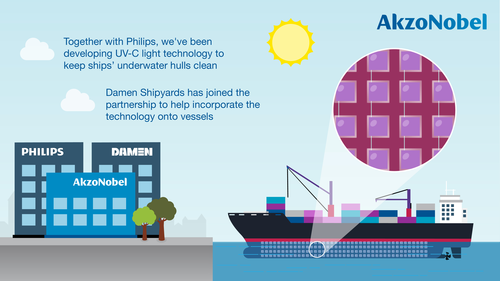MONDAY, APRIL 17, 2023
Last week, global coatings company AkzoNobel announced that Damen Shipyards has joined the company and Philips to further develop a fouling control solution that uses UV-C light technology to keep ships’ hulls clean.
According to the release, the technology being used integrates UV-C light-emitting diodes (LEDs) in a coating scheme which emits just enough light to provide total prevention of bio-fouling accumulation on the protected area.
AkzoNobel reports that small-scale trials have been successful, but bringing Damen Shipyards on board will add vital expertise in areas such as vessel integration.
“We’re both delighted and excited to welcome Damen Shipyards to the consortium,” said Ralph Slikkerveer, Research and Development Director for Marine, Protective and Yacht Coatings at AkzoNobel. “As a leading international shipbuilder, they’ll bring essential knowledge and experience and significantly increase our chances of success.”
Following the partnership, the three companies will work together to create a fully biocide-free fouling control solution which will provide “groundbreaking performance,” as well as lead to substantial economic and environmental benefits.
"As a leading global innovator, Philips is continuously developing and expanding its extensive catalog of technologies that bring opportunities for growth and innovation in many business areas,” explained Jako Eleveld, Head of IP Licensing at Philips.

 |
| AkzoNobel |
|
Last week, global coatings company AkzoNobel announced that Damen Shipyards has joined the company and Philips to further develop a fouling control solution that uses UV-C light technology to keep ships’ hulls clean. |
“By offering access to our technologies through our technology licensing programs, we drive cooperation with partners that share our commitment to delivering impactful innovations. It’s great to see that Philips' UV-C technology has found its way to this innovative antifouling solution, which will benefit the shipping industry while at the same time enabling a positive environmental impact.”
Jasper Schuringa, Head of Corporate Venturing at Damen Shipyards, added: “This is a very exciting project and an excellent fit with our own strategy to become the world’s most sustainable shipbuilder. There’s still some way to go, but the solution being developed clearly has the potential to reshape how the industry has traditionally thought about anti-fouling systems.”
Philips reportedly began experimenting with the UV-C LED technology in 2014. The tech had been used in water treatment and sterilization applications, but was never tested in open water. By joining with AkzoNobel, the companies report that promising progress has been made to the point where trials on commercial trading vessels have taken place.
One of the next steps is expected to be vessel integration, and AkzoNobel adds that all three partners will now work towards creating a commercially viable solution in the near future.
“It’s a challenging project, but it’s also a fantastic example of the benefits of collaborative innovation,” continued Slikkerveer. “By working together as a strong partnership of three complementary Dutch companies, we’re confident we can combine our capabilities to deliver a sustainable solution that could completely revolutionize the fouling control industry.”
UV-Based Antifouling Tech
Back in 2018, AkzoNobel announced that, alongside Philips, it had developed a novel antifouling solution that uses ultraviolet LED light. The technology, according to AkzoNobel at the time, integrates UV LEDs from Philips into a marine coating system developed by the paint company. UV light would then be emitted from the coating surface, preventing organisms from collecting on the surface.
The UV-based approach eschews the use of biocides, which have been effective in preventing fouling but have come up against health and environmental concerns. Antifouling coatings containing tributyl tin are largely banned now, and popular copper antifoulants, while still commercially common, have been subject to debate in recent years.
The project of incorporating the LED technology into coatings on ship hulls and other structures is obviously a difficult one in terms of initial effort. AkzoNobel, however, said it expects to overcome the early challenges and is predicting the new technology will “revolutionize the fouling-control industry.”
AkzoNobel said at the time that it intends to focus initially on using the new coating technology to protect ships, yachts and offshore assets.
Tagged categories: AkzoNobel; Antifoulants; Coating Materials; Coatings technology; Coatings Technology; Environmental Controls; Marine; Marine; Marine Coatings; Partnerships; Program/Project Management; Research and development; Ships and vessels; Smart coatings; Technology